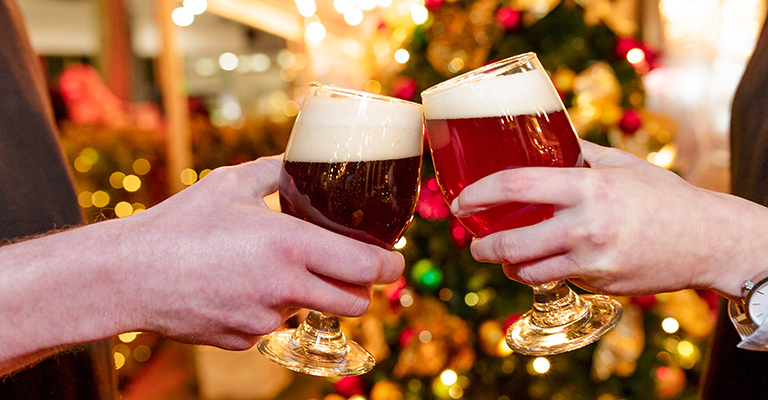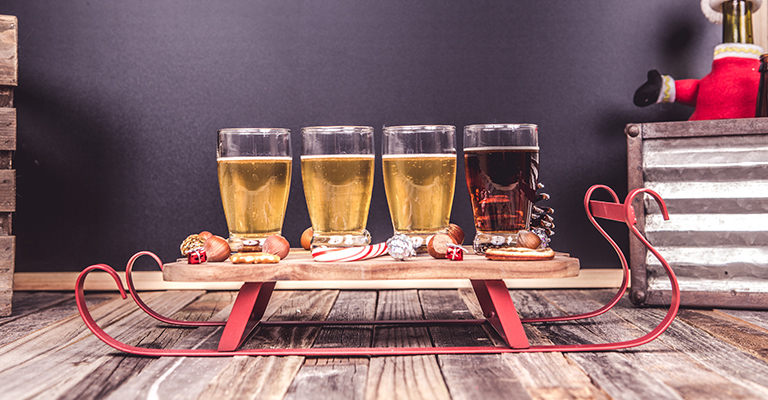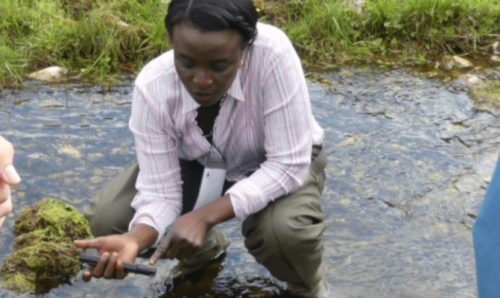Most wonderful time of the beer: Yeast biodiversity promises exciting new flavours
Research impact and institutes 9th December 2021
It’s that time of year.
The snow comes down, the decorations go up… and – for many of us – so does our consumption.
And why not? Christmas is, after all, a celebration.
Why not that extra slice of Christmas cake? That little glass of sherry?
And for beer lovers the festive season might soon become even merrier – thanks to the Universities of Manchester and Leicester, and the prospect of new and exciting flavours!

Ho ho hold my beer
You see, scientists at the two universities have been able to successfully develop unique fertile hybrid yeast strains. Now, that might not mean much to your average pub goer this yuletide – but it might soon spice up what they can order at the bar.
The yeast strains offer novel options for flavours, intoxicating possibilities for aromas, and intriguing opportunities for new and alternative brewing processes.
Led by Professor Daniela Delneri, Professor of Evolutionary Genomics at the Manchester Institute of Biotechnology, the team has produced fertile yeast hybrids that can breed and generate a large number of progenies, with diverse genetic traits.
And – importantly for the beer devotees among us – this offspring has the specific, desirable characteristics that are needed for the beverage manufacturing process.
We’ll certainly drink to that!

Better not stout, I’m telling you why
As anyone heading out for a Christmas drink this year might note, there has been a big increase in beer variety over recent years. This new research, however – conducted in collaboration with SB-Miller and the world’s largest brewer, AB-InBev – could push those (saloon) doors open even further.
The unique fertile hybrid yeast strains differ from other hybrid yeasts, which are naturally infertile. This meant their specific characteristics could not be passed on – until now.
Brewers have hoped to develop yeasts for new flavours since as far back as the 1800s. This is because the type of yeast used in the fermentation process directly impacts the taste of the beer you nurse, down the pub or around the Christmas market.
Ale and lager remain the two principal yeast categories, and modern brewers are using hundreds of variations to produce the many different beers you see in the shops.
That there could soon be even more… sounds like a wonderful Christmas present to us!
‘Tis the saison
“This technology has the ability to revolutionise the current practices for strain selection by allowing, via breeding, the rapid creation of efficient tailored yeasts carrying specific, novel, and important traits,” Professor Delneri explains.
“As well as opening opportunities in food and drink production, this approach could be used to develop novel yeast ‘cell factories’ that could be used in the field of industrial biotechnology to sustainably biomanufacture pharmaceuticals, chemicals and fuels.”
Dr Philippe Malcorps, AB-InBev ‘yeast guru’, adds: “We are excited by these findings and pleased to have been able to support this research. The proof of concept opens doors to new innovations we can bring to our portfolio offering exciting new flavours via fermentation.”
It certainly sounds exciting to us, too.
And while it’s not immediately clear when we’ll get to try these new flavours – it might be a few Christmases yet – as we all know… good things come to those who wait.
If you enjoyed this post, be sure to subscribe on our homepage to keep up to date with the latest posts from The Hub.
Words: Joe Shervin
Images: Shutterstock
Manchester Institute of BiotechnologyWomen of STEM





Zoe says
Wow. :0 I didn’t even know Daniela was working on this really interesting. 🙂
Daniela says
What a fab article! 🍻
Daniela says
What a fab article! Cheers 🍻
Javier says
Exciting news for beer fans!!!
Alkisti says
Cheers to beer lovers 🍻🍻 Great work!!
Soukaina says
Nice article ! It’s such an exciting and promising research ! 🎉🍻